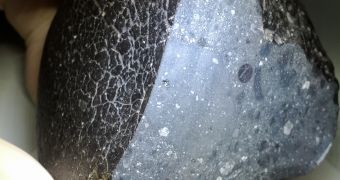A meteorite that landed in the Sahara desert has scientists all giddy since this is no ordinary space rock. It originated from Mars, it's two billion years old and, best of all, it's full of water.
Well, "full" of water considering that it's a piece of Mars that traveled through space for who knows how many millions of years and then survived a scorching trip through the Earth's atmosphere only to land in Sahara, one of the driest places on Earth.
Scientists found about 6,000 parts per million of water in the rock, not much, but about 10 times more than from any other known Mars meteorite.
The rock also shows signs of being altered by water, indicating that water was present near its location when it was still a part of our neighboring planet, even though most of the planet was dry and dusty at that time.
The meteorite, dubbed NWA 7034 and nicknamed Black Beauty, is very similar to the volcanic rocks analyzed by the Spirit and Opportunity rovers on Mars.
The high water content and alterations indicate that the rock originated from near the Martian surface, not from deeper in the crust as with other Mars meteorites.
Its age is also important as it places it during the transition period from a warm and wet Mars to the cold and dry one of today.
Most Mars meteorites recovered are only 1.3 billion years old, with the oldest being 4.5 billion years old. But there was none from the period in Mars' history NWA 7034 originated from.
Analysis reveals that the rock is the result of a volcanic eruption some 2.1 billion years ago. Flowing water helped cool it, giving it its particular look and composition. The findings of the analysis were published in the Science Express journal.
With Curiosity on the Martian surface specifically looking for signs of life and clues to Mars' history, scientists won't have to rely on rocks flung by chance all the way to Earth to find out more about the red planet.

 14 DAY TRIAL //
14 DAY TRIAL //